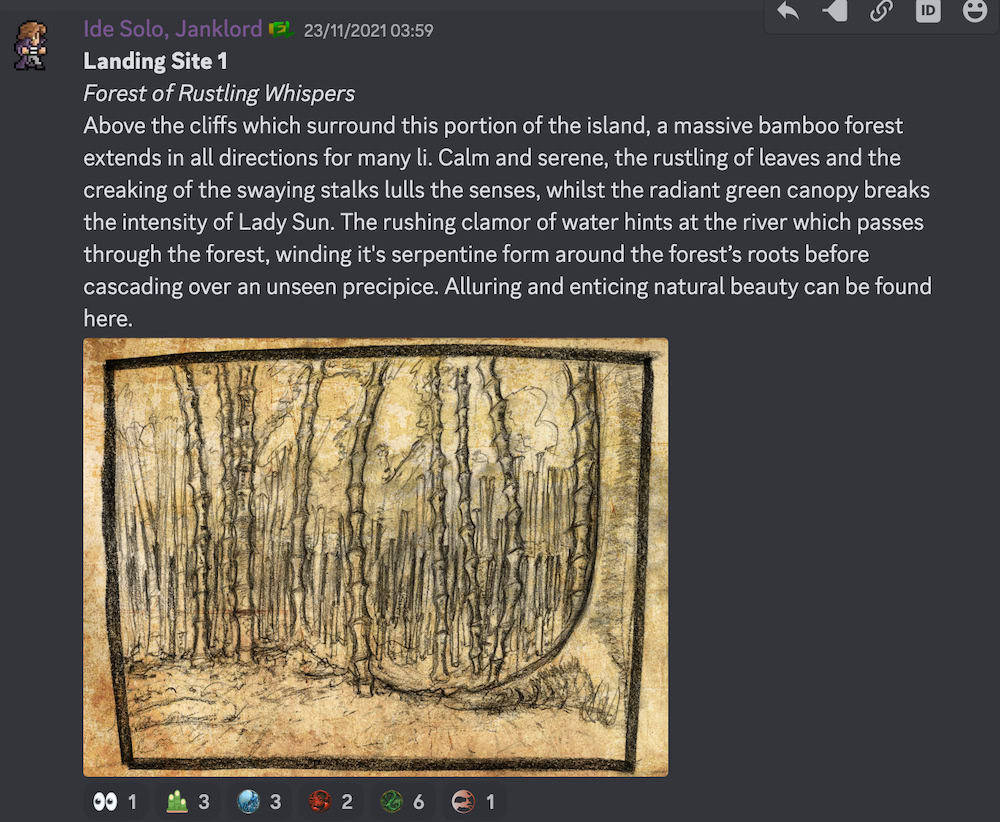Today we will go into detail regarding story prizes. Our Phoenix lead author, Tariq Ali, has summarised what we should allow the community to decide and what not, takes a look at what the community already did decide, and what the effects of story prizes on cards, story, and future development are.
On November 2nd 2020, back when the Living Card Game was still officially supported by Fantasy Flight Games (FFG), An Impossible Task was released. It was a choose-your-own-adventure game where you play as a ronin participating in a border skirmish between the Unicorn and the Lion clan. At the end of the game, you submit your results to FFG. These results would then be aggregated by the Story Team and the final results were published in a short story Heroes of Legend: Chapter Two.
I played this game and submitted my results to FFG. I was just one person, of course, and my playthrough was merely one of thousands of playthroughs that the Story Team consulted. But for a brief moment of time, I was immersed in Rokugani politics. I considered what would be my ronin’s best choices and had to make important choices based on what would be best for my character.
One of those choices was deciding whether to assist the Lion clan during the Battle of Four Roads, or stay on the sidelines and let the Unicorn clan win the battle. During the game, I worked under the Lion commander, Ikoma Tsanuri. She had given me a duty to fulfill, but I could go beyond that duty. I could have acquired more glory, fame, and knowledge. If I exceed my duty though, I would be making the Lion clan more powerful. I could not help out a future enemy, even if they are my present allies.
I chose to stay on the sidelines, allowing the Unicorn clan to triumph at the Battle of Four Roads. Ikoma Tsanuri did not hold this act of neutrality against me though, as I fulfilled my duty to her in all other respects (determining the final fate of Commander Akodo Kyosuke, intercepting a scroll from a Unicorn messenger, and refusing to open the scroll).
Other ronins, in other playthroughs, made their own choices, using their own reasons. Together, we all struggled against each other for the chance to win a story prize and influence the course of events on the Rokugani mainland. When the final results were published, I felt a sense of ownership over the outcomes. My minor playthrough contributed to the lore in a minor way. Today, I can point to the results in Heroes of Legend: Chapter Two, and claim that I (along with the rest of the L5R community) played a role in shaping it.
Story prizes differentiates Legend of the Five Rings from most other settings. I was attracted to L5R, not because of its samurai fantasy setting, but rather the opportunity to participate in building that samurai fantasy – and this is generally done via story prizes. Thus, both the developers and the audience work together in a world-building exercise.
Here’s a pretty simple, generic definition of a story prize: the ability to provide limited input to a story. And there is a story, or at least, a traditional dramatic curve, with a beginning, middle, and end. The Story Team understands the big picture, and is prepared to reveal that big picture in small bits and chunks. The audience, though, decides on some of the details of that big picture – and those details can be significant. There’s an old Pavarre saying: the devil is in the details.
To illustrate this dynamic, let’s showcase the first two story prizes of Emerald Legacy.
Emerald Legacy Launch Tournament
In the Emerald Legacy Launch Tournament, players from the seven great clans of Rokugan competed for the “distinction of escorting the honored Imperials and their guards” to Sanctuary.
The winner of the tournament was Daniel Correas/Daigotsu Kaikou of the Crab Clan. Thus, the Crab clan received the honor of being the Imperials’ escorts. It would have been possible for the story prize to be reflected in the lore as a single sentence:
“The Crab clan escorts the Imperials and their guards to Sanctuary.”
…followed by nothing else. The big picture proceeds onward, unaffected by the nature of the Imperials’ escorts. The letter of the prize is maintained, yet the result would not be meaningful. At first, this would not lead to immediate negative repercussions. After all, the winning clan also receives a bonus whenever they use the card The Empress’ Legacy, so the Crab would receive some mechanical benefit for their escort mission, but nothing more.

I cannot speak on behalf of the playerbase (as I do not play the card game), but if I was in Daniel Correas’ shoes and I won that story prize, I’d expect to see my efforts matter. If I only see a single throwaway line and a bonus on a card that I might not even use, disillusion would set in. The trust I had in the Story Team would evaporate. I would probably keep playing the game. But it would be out of love for the game mechanics, not out of a belief that I could ever influence the lore in any meaningful fashion. My engagement with Legend of the Five Rings would diminish overall. The ramifications of a throwaway story prize is subtle, but long-lasting.
Luckily, the “distinction of escorting the honored Imperials and their guards” is not throwaway fluff. This was proven in both The Water Path (where the Imperials decided to appoint the Crabs as the Imperial protectors, not just mere escorts to be promptly ignored once the journey is complete) and the Foundations of Hope (where an Imperial palace is built within Crab territory). Butterfly effects have kicked in – a simple escort mission blossomed into Imperial influence. It’s a detail – but a very important one.
Landfall Tournament
The second tournament, Landfall, focuses on the partition of Sanctuary. From a Reddit post that I wrote about this tournament:
“Each player seeks to earn points for their clan. The clans then pick on the basis of clan scoring (so 1st place gets to pick 1st, then 2nd place gets to pick 2nd, etc.). It’s the ‘Top of Clan’ that actually picks on behalf of the clan, so the ‘Top of Clan’ may decide to make a unilateral decision, or hold open discussions and surveys to determine what the rest of the clan thinks.”
Over a period of a few days, a series of messages in the #emerald-legacy-announcements channel in the L5R Discord were posted, revealing the following two things:
- A brief description of nine different landing sites
- A map of Sanctuary indicating the location of each landing site

Using only this limited amount of information, each great clan must choose a single landing site to settle on. Players talked with each other on the L5R Discord, discussing what landing sites to pick based on their position on the map and the possible benefits that each site might bring – both to the clan itself and to the broader lore. Some players even gave their own unofficial rankings for each landing site, to advise their Top of Clan. Though the clan might not get their most preferred location, players hoped that they might still be able to settle at a decent landing site.
Since there were nine landing sites and only seven great clans, a remainder of two landing sites would be left unoccupied. This was intentional. Since the clans pick based clan scoring, there would necessarily be a 7th place clan. If there were only seven landing sites, one for each clan, then the 7th place clan would not be able to make any choice whatsoever. By having nine landing sites though, the 7th place clan could still make a decision – picking between three possible options.
After the Landfall tournament finished, each clan began exploring their landing site. At time of publication, five out of seven great clans’ fictions have been released, each of them dealing with the theme of exploration:
- The Scorpion clan explores the Jade-Colored Rocks in Fresh Water and fights the golems that guard the Nine Fortresses.
- The Dragon clan explores the Cliffs of the Sea Dragons in Deduction and discovers a shrine with ancient writings – writings that refer to the kami Shiba.
- The Phoenix clan explores the Empty City in Knowledge, and consorts with mysterious spirits who sing the “glory of the five rivers.”
- The Crab clan explores the Shore of the Ashen Flame in Foundations of Hope and start moving the Imperials’ flagship to the lake Aratana Hajimari.
- The Unicorn explores the Obsidian Caves in Song of the World – Part 1 and investigates strange nightmares – nightmares that lead to deities.
- The Mantis clan, who secretly followed the great clans to Sanctuary, gets to explore as well, visiting the Barren Swamps (one of the unclaimed landing sites) in Blessed Are The Content. Despite being stuck in a swamp, the Mantis are mysteriously content.
I don’t think it’s much of a spoiler to say that there are secrets hidden in each landing site. This tournament has decided how those secrets get revealed, and who gets to reveal them. Butterfly effects may eventually kick in, as different clans exploit their secrets in different ways.
For now though, the selection of landing sites have a direct influence on two other tournaments. The First Clan Rivals (Crab v. Unicorn), and the Second Clan Rivals (Lion v. Scorpion) were based on border disputes between neighboring landing sites. Thus, it could be said that the Landfall tournament was responsible for the first two military skirmishes on Sanctuary itself.
The Landfall tournament also impacted the location of the Imperial palace that was built in Foundations of Hope. The Imperials liked the Crab clan and wanted to settle right next to them. Thus, when the Crabs selected their landing site, they also secretly selected where the Imperials would settle as well.
Designing Story Prizes
So far, I have just talked about three different story prizes – one from FFG and two from Emerald Legacy. They all had their various differences, but there is one common trait that unites them all. Every possible choice was evaluated beforehand by the card game’s stewards.
This is most obvious when one considers the nature of An Impossible Task. As a game, all possible options must have already been programmed in. But limits also exist for “Emerald Legacy Launch Tournament” (only one of seven clans could secure a certain honor that the Story Team came up with) and “Landfall” (nine landing sites were created by the Story Team, and clans could only pick from these sites).
It is not enough to merely come up with an idea, but to also think through the implications of that idea and come up with all possible results. “Emerald Legacy Launch Tournament” was fairly simple – the victorious clan would gain Imperial influence, and there were only seven possible clans who could gain that influence. “Landfall” was far more complex though – there were nine landing sites, and seven clans who could potentially occupy those landing sites, meaning sixty-three possible outcomes to account for. We also had to think about what would happen with the remaining two unoccupied landing sites as well, which meant thirty-six possible outcomes for us to account for (one for each pair of unoccupied landing sites). “Landfall” had a total of ninety-nine possible outcomes.
This leads to an interesting question – why do we need to limit player choices at all? In theory, we could write an open-ended story prize. “Tell us what will happen to the Imperials as they travel to Sanctuary.” “Write up a Landing Site and we’ll place it in the story.” However, there are two problems with doing this.
First, this exposes the lore to a lot of risk. We may get good ideas, but we may also get not-so-good ideas as well. There’s a lot of variability involved, and people (including members of the Emerald Legacy project) may get disappointed with the outcomes. For a small group, like a traditional tabletop roleplaying party consisting of a GM and players, these risks can be managed effectively. For a larger group though, like the playerbase of a Living Card Game, these risks would be unmanageable.
Second, even if we do get a good idea, we would need to figure out how to integrate it into the big picture. Since we plan on telling a story, we can’t just post an outline of said big picture and spoil everyone. Thus, though we initially save some time by coming up with an open-ended story prize, we actually spend more time trying to incorporate the open-ended story prize in a meaningful way (and it must be incorporated in a meaningful way, otherwise the open-ended story prize would be pointless). There’s a sense of technical debt here – we borrow from the future to help out the present. Eventually though, we have to pay that loan off.
Therefore, most of Emerald Legacy’s story prizes will require an initial effort on our part.
Exceptions to our story prizes
There are two exceptions – the “Name An Item” tournament story prize offered at the 2022 Jigkou Invitational, and the “Name A Card” story prize offered at the 2022 “Name A Card” tournament. Though these tournaments do not have explicit limits, the story team does retain the right to veto player inputs. It must be stressed though in both tournaments, only a single “thing” gets to be named. This helps us meaningfully incorporate the player input into the big picture. Therefore, these story prizes are not open-ended – players are still implicitly limited in their influence.
If we want the story prizes to be meaningful (and not throwaway lines), we would have to define all the possible outcomes, think through them deeply, and determine how they can be incorporated into the big picture. We also cannot rely on a single story prize template to help reduce prep time, because that could lead to boredom as well.
We could mass-produce story prizes if we also take away their meaning and make them throwaway sentences in the lore. Doing so, however, would be betraying the playerbase’s trust. For better or for worse, we have to limit the number of story prizes that can be offered (2 story prize tournaments in 2021, and 4 story prize tournaments in 2022). Not every official Emerald Legacy tournament will have story prizes, simply because we want to ensure that each story prize is meaningful.
There is one interesting side-effect that comes from this restriction on the number of story prizes. It makes each individual story prize more special. I enjoy An Impossible Task and wish that FFG made more games like this. Yet, if FFG were to release games like that every week, then each individual game would not matter as much to the lore. A story prize offered in Game #1 can be just as quickly undone in Game #4. It is possible to have too much of a good thing.
Optionally, a story prize would also have immediate repercussions that people can grasp. A good example of that would be the Landing Sites in the “Landfall” tournament. The playerbase instantly grasped why the Landing Sites were important, even if we ignore the butterfly effects that might occur later on from those choices. By contrast, the “Emerald Legacy Launch Tournament” story prize relies heavily on potential butterfly effects to sell its impact.
The problem with butterfly effects is they are subtle and can only be revealed by the release of fictions long after the tournament has been completed. If anything were to happen to slow down or even halt the release of these fictions, we would be delaying the payoff for those story prizes. The playerbase may be disappointed, and we might lose their trust.
However, many times, it’s hard to come up with a story prize that has immediate repercussions while also still fitting into the big picture. Therefore, we may be prepared to offer a story prize that does not have immediate repercussions, and hope that we can later release a follow-up fiction that reveals its butterfly effects.
Conclusion
The current company I work for, Improving, is a software consultancy that tries to build trust with its customers and employees. To help build trust with others, the company seeks to clarify expectations and create transparency in their work. If people know how the company operates, and knows what the company can and cannot do, they are more likely to trust it.
The reason I wrote this article is to build trust with the playerbase of Emerald Legacy. Its goal is to explain how story prizes work and how they are created. Story prizes may seem magical, but they require a lot of hard work in the process and trade-offs to be made. There is a reason why story prizes are rare and why Legend of the Five Rings is one of the few games that attempt it. The results of story prizes though, in terms of worldbuilding and player engagement with the lore, are worth the effort.




